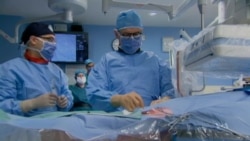An agreement signed in Washington by the American Heart Association and the People's Republic of China could result in improved knowledge about heart disease that can be shared with health care workers around the world.
The agreement provides for training in cardiopulmonary resuscitation (CPR), which ordinary citizens can give to someone having a heart attack. It also provides for exchanges of doctors, public health specialists and scientists to work alongside their counterparts in the U.S. and China.
In China, the need is enormous.
"In China, stroke is the number one cause of death and heart attack is number two," said Dr. Sidney Smith Jr., a past president of the World Heart Federation.
The World Health Organization reports that cardiovascular disease, which includes heart disease and stroke, is the number one cause of death globally, and that more people die annually from cardiovascular disease than from any other cause.
Growing Problem
As of now, cardiovascular disease kills 17 million people a year globally, and that number is only expected to rise. WHO projections show that by 2030, 23 million people will die annually of stroke or heart disease.
More than three-quarters of cardiovascular disease deaths take place in low- and middle-income countries because people in these countries do not have as much access to preventive care, early diagnosis or treatment.
Smith said the partnership between the Heart Association and China could produce beneficial results for all countries.
"We have seen in the United States, over the last 10 years, a 30 percent reduction in deaths from heart attacks, a 16 percent reduction in deaths from congestive heart failure, and a 5 percent reduction in death from stroke," he said.
CPR Benefit
The American Heart Association says CPR given immediately after a heart attack can double or triple a person's chances of survival. Without it, the chance of dying increases by 10 percent for each minute that passes.
Because of China's vast population and the prevalence of heart attack, the association says the likelihood is high that a bystander will need to respond to someone who has collapsed from a cardiac arrest.
In the U.S., only about one in four people is trained to give CPR. The situation is worse in China, said Dr. Gordon Tomaselli, chief of cardiology at Johns Hopkins Hospital in Baltimore.
"Cardiac arrest in China is a devastating problem. Very few people survive," he said, "because there are very few first responders that can do basic cardiac life support."
Tomaselli is a member of one of the working groups that will help with the exchange of scientific information between medical scientists in the U.S. and those in China.
Global Nature
At the signing ceremony, the American Heart Association's Douglas Boyle emphasized the global nature of the work that will be done between U.S. and Chinese scientists and health care providers.
"We believe that together we can change that by creating a world of lifesavers, a world where everyone can live a healthier and longer life," he said.
The fact that cardiovascular disease is so prevalent in low- and middle-income countries indicates lifestyle changes around the world. In most countries now, people live in urban areas. Smith said, "There’s been a real change in lifestyle, which previously was relatively healthy and protected, into one that is a risk factor," he said. People are eating fast foods. They're getting less exercise and they are smoking tobacco products."
Doctors can treat cardiovascular disease with medicine to correct high blood pressure, high cholesterol and other issues, but most cardiologists maintain that most cardiovascular disease is preventable.
"A lot of heart disease is not a medical disease, it’s a pre-medical disease," Tomaselli said. "We do a remarkable job at what’s called secondary prevention and treating heart disease once it occurs. We would do a far better job, it would be much more efficient, if we prevented heart disease in the first place."
He said that's why educating the public about the benefits of exercising, eating a good diet and not smoking are the key to prevention, as are efforts to reduce environmental hazards like air pollution. The rest is learning about the heart and the vascular system, how to keep it running smoothly, and how to help when it doesn't.





